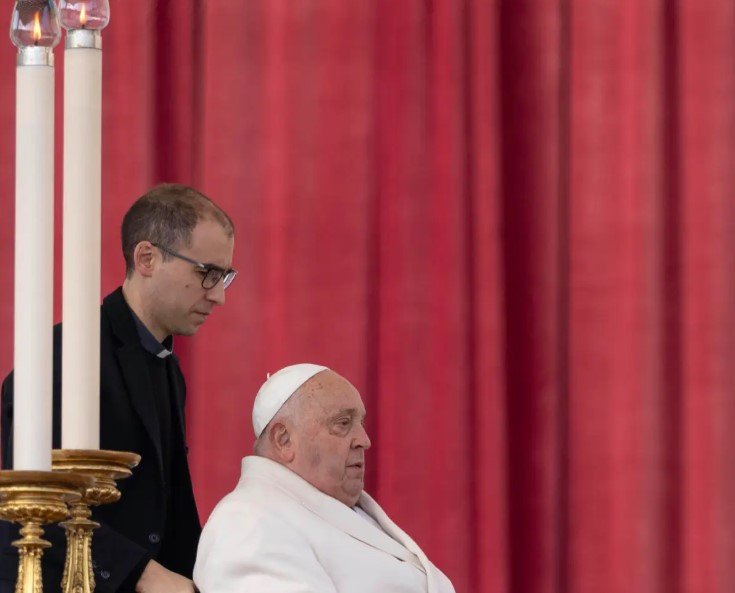Pope Francis has encountered another serious respiratory complication, requiring doctors to place him back on noninvasive mechanical ventilation. The Vatican confirmed late Monday that the 87-year-old pontiff suffered two acute breathing crises due to a “significant accumulation” of mucus in his lungs, exacerbating his ongoing battle with pneumonia.
A Fragile Recovery Takes a Turn
The Vatican’s latest statement described the pope’s condition as serious but stable. His medical team carried out two separate bronchoscopies, procedures that involved inserting a camera-equipped tube into his airways to extract mucus. The accumulation, officials said, was his body’s response to the pneumonia rather than an indication of a new infection.
The pontiff had initially shown signs of improvement over the weekend, raising hopes that he would soon return to his regular schedule. However, the sudden respiratory distress episodes required immediate medical intervention.
Doctors Work to Clear Pope’s Airways
The procedures performed on Pope Francis were deemed necessary to ease his breathing and prevent further complications. Doctors successfully extracted large amounts of mucus, which had been restricting airflow and contributing to his distress.
- The bronchoscopies ruled out a secondary bacterial infection, as lab tests showed no new pathogens.
- Physicians confirmed that his immune system is still actively fighting off the original pneumonia.
- Despite requiring respiratory support, the pope remains conscious and alert.
A source familiar with the situation stated that while the pope’s condition is concerning, his age and previous health challenges mean such setbacks aren’t entirely unexpected.

Uncertainty Surrounds Upcoming Papal Events
With Holy Week approaching, the Vatican faces logistical challenges. Pope Francis had been scheduled to preside over key religious ceremonies leading up to Easter, but his participation is now uncertain.
- The Vatican is making contingency plans, potentially delegating major responsibilities to senior cardinals.
- Pope Francis’ weekly general audience may be canceled if his condition does not improve significantly in the coming days.
- His doctors are closely monitoring him to determine whether he will be able to deliver his traditional Easter Sunday address.
The pope’s ability to continue public engagements has been an ongoing concern since last year when he was hospitalized multiple times for bronchitis and other health-related issues.
Faithful Gather in Prayer as Concerns Grow
Outside the Agostino Gemelli Polyclinic in Rome, where the pope is being treated, groups of faithful have gathered in prayer. Some carried candles, others held rosaries, expressing deep concern for the leader of the Catholic Church.
One attendee, Maria Teresa Lombardi, 67, traveled from Naples to pray outside the hospital. “We are here because we love him. He is a pope of the people, and we want him to know he is not alone,” she said.
Meanwhile, cardinals and bishops around the world have urged Catholics to keep Pope Francis in their prayers, emphasizing his resilience and unwavering commitment to his mission despite his health struggles.
A History of Health Challenges
Pope Francis has faced multiple health issues in recent years. His mobility has been limited due to chronic knee pain, forcing him to use a wheelchair for many public events. Additionally, he underwent colon surgery in 2021 and battled bronchitis in 2023.
Here’s a look at some of his recent medical concerns:
| Year | Health Issue | Medical Response |
|---|---|---|
| 2021 | Colon Surgery | Partial colon removal |
| 2023 | Bronchitis | Hospitalization, antibiotic therapy |
| 2024 | Respiratory Infection | Short hospital stay, rest advised |
| 2025 | Pneumonia | Noninvasive ventilation, bronchoscopies |
Given his history, experts say that respiratory illnesses pose a significant risk, making the Vatican’s medical team particularly cautious in their approach.
Looking Ahead: What’s Next for Pope Francis?
While the Vatican remains hopeful about his recovery, it has not provided a definitive timeline for his return to normal activities. His ability to lead the church in the coming weeks will depend on his body’s response to treatment and whether further complications arise.
For now, the world watches and waits, hoping the pope’s health stabilizes before one of the most important celebrations in the Christian calendar.
